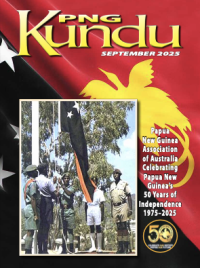27. ‘Better late than never’: Defending the rights of a convicted man
Paul Quinlivan’s Snapshots
The Queen against Atemba was one of two cases which caused confusion because, in the Committal Hearing, they were prosecuted by the European Police, giving the impression to the Magistrate, and to everybody else, that they were ‘town’ cases. In fact, they had been brought in from a remote area but the European Police were ‘helping out’ because the Kiap who did the patrol had become ill and was then posted.
On 27 April 1957 I returned to Madang after spending nearly a week with Jack Page and Jack O’Shea slithering down the escarpment from Dr Braun’s hospital at Amele and slogging through the jungle to the remnants of the old German road to the Sepik – and living down the rollicking hilarity of the PNG Police who had rescued me when I sneaked off to have a pee in private. There was no pathway and we were moving along the river bank so a path had to be cut through the thick growth. Suddenly, to one side, there was this gloriously clear patch of white sand so, never having been in the bush before – and busting to relieve myself – I ducked towards it not knowing that I was stepping onto the quickest quicksands in TPNG!
The District Commissioner, Les Williams, told me that some long-term prisoners had told one of his Kiaps, John Thyer, that they thought that Atemba, a ‘not very bright prisoner, mentally’, was wrongly in gaol. In most countries long-term prisoners would have got a thick ear for talking like that but, in the TPNG of those days, Kiaps believed that there is nothing worse than having the local community laughing behind your back because you have the wrong person in gaol. They also had real feelings about the Trusteeship Agreement, the Rule of Law and the Liberty of the Subject. In this case, the DC said that John Thyer had made a special inspection, as Visiting Justice under the Prisons Ordinance, devoted exclusively to Atemba, and he agreed that the long-termers might be correct and he gave me the file.
I had, by that stage, prosecuted hundreds of cases before the Supreme Court and defended dozens so, although I remembered Atemba’s name, it meant nothing to me. When I read the file the case immediately came to mind and my evidence at the trials of Omis, the real killer, and Kikisauma, the interpreter who was his accomplice, was as follows: I remembered the case very clearly because not only was it the only one I had ever been involved in where the same interpreter was used in the Supreme Court and in the Lower Court, but also because it was about the only time, during my first six months on circuit, where I had had a day off! And I spent it, with Monte, searching for an interpreter! The reason for the ‘holiday’ – which was a Sunday – was that our Sittings in Manus were lengthy and we had to shuttle back and forth on the Islands-hopping ‘Milk Run’ plane to keep up with our schedule. Monte was always most meticulous about making sure that the interpreter in the Supreme Court was a ‘clean skin’ and the Kiaps, knowing this, went to great lengths to find an independent interpreter but, since most Papua New Guineans were naturally gifted in languages, this generally presented no great problem. As soon as we arrived at Madang, the first time, however, they informed me that they had exhausted all avenues of inquiry – even sending out a general plea to all plantations – but had failed. Then, on Sunday morning, a report came in from the Catholic Mission at Alexishafen saying that they had a man nobody could talk to out at their new caribou pen at Sek, and he might be from the area. So Monte got the DC’s car and off we went, taking Atemba with us. But our trip was unsuccessful because Atemba and the man could not understand each other.
Because of the V.J. Report (and mine) the Administrator released Atemba and a patrol was mounted to take him back home. It was an excellent example of defending an innocent man, even though it was a little late. In other countries I feel that nobody would have bothered, but Les Williams, John Thyer and everyone else at the Madang District Office did what was right, and they should be justly proud of it.


